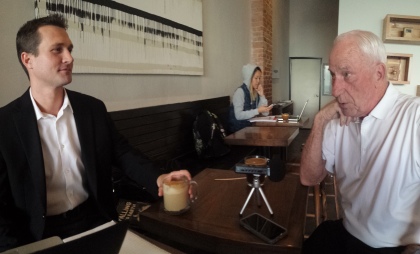
 By Jonathan Stroud
By Jonathan Stroud
JournalistsForSpace.com
Journalists For Space sat down for coffee with Apollo 15 astronaut Al Worden to find out his perspective on the universe, his career, and his thoughts on the future of human space exploration.
Born in Jackson, Michigan on February 7, 1932, Worden is one of only twenty-four human beings to have journeyed to the moon. Having graduated from the U.S. Military Academy, Worden logged over 4000 flying hours during his 20 years in the Air Force. Selected by NASA in 1966, he helped support the Apollo 9 mission as astronaut support crew and the Apollo 12 mission as the backup Command Module Pilot. Worden served as the Command Module Pilot for Apollo 15 in 1971.
Apollo 15 was the fourth manned lunar mission, one of NASA’s most scientifically successful and geologically diverse missions. During Worden’s return journey from the moon, he conducted a deep space walk, known as an Extravehicular Activity (EVA). To this day, Worden still holds the record for the furthest deep space EVA.
Published in 2011, Al Worden and Francis French wrote the best-selling autobiography Falling to Earth: An Apollo 15 Astronaut’s Journey to the Moon which chronicles Worden’s life including the events that led to the historic Apollo mission as well as his post-lunar life.
Today, Worden passionately promotes STEM outreach through his service on the board of the Astronaut Scholarship Foundation.
“What people do not understand about the space program is that the primary product of the space program is not going somewhere; it’s developing the technology to go there.”
– Al Worden
Coffee With an Astronaut: Al Worden

Q: How did your perspective on life, the universe, and Earth change as a result of the mission to the moon?
I kind of have to go back a little bit. I was probably in the majority of people who didn’t really understand the universe and didn’t really understand where we were in it…Probably still don’t, but I had a view of the universe out there that nobody else has ever seen. There’s a portion of the trajectory that is shadowed by both the Earth and the Sun and that portion of the orbit; you see the universe undiminished by an atmosphere–I saw just light. There’s so many stars that you can’t just see an individual star. It’s just light. It kind of changes your perception of what we’re all about.
I did a little studying after that [Apollo 15 mission] and came to realize that our Milky Way galaxy contains something like four hundred billion stars. You realize, talking to the right people, that there’s a couple hundred billion galaxies out there like the Milky Way. I had finally started asking astronomers that if that’s true, then how many universes are out there? And the answer you get back, if it had been ten years ago, would have been, “No there aren’t any. We’re the only one.” Now they’re saying that we don’t really know. So, there’s a perception of the universe that we live in that is pretty minuscule compared to what the universe…well, to what we see out there and what it’s really like. The upshot of all that is that you come to the conclusion, eventually, that there are a finite number of planets out there that can sustain life. Of those, there’s probably life on some of them. So, there’s intelligent life out there; there’s no question about that in my mind.
This is a common thread that Carl Sagan used to talk to us about, that there is going to be a certain number of planets with life on them. We don’t know where they are, but we’ve got programs here on Earth to search for their radio signals, called SETI, and it’s still ongoing so you don’t know. But the point is, they’re probably there and it might be worthwhile for us to find out. Except for the fact that if they [intelligent life] found us, they’d probably find us pretty basic, like how we find animals. I mean, I can imagine a civilization that’s a million years advanced on us. A million years is nothing in universal time. So there’s going to be some populations out there that are pretty dog-garn smart that can do things we can’t do.
Which kind of brings me back to my central theme about space: in my opinion, the whole space program is a drive that we have that we don’t even understand, that forces us to develop those kinds of programs and systems that will allow us to go somewhere else when we can’t live here anymore. I think that’s what other intelligent species out there have already done. I don’t think we’re any different. I don’t think we’re any different than anything that grows here on Earth which has prime imperative of survival of the species. That’s what we’re all about too. So I see the space program a little different than most people do. I see it as the beginnings of a long, long term program. I’m talking thousands and thousands of years to develop the capability to take people to the nearest planet that can sustain life.
I’ll carry that one step further, I do believe that the imperative of what’s alive here on Earth is to survive. That’s why grass sends out seeds. That’s why trees do the same thing and animals procreate. Interesting analogy with the Indians in the South Pacific: they all started in one place and when the volcano on their island blew up, they got in their canoes and went to the next island and then just kind of went all throughout the South Pacific. They’re probably all a part of the same family somewhere back in history; but now, they populate the whole Pacific. I think people in the universe are the same way. They’re going to go out and they’re going to populate other planets because they can’t live on the one they call home anymore. It’s a little further out than most people I talk to would like to think.
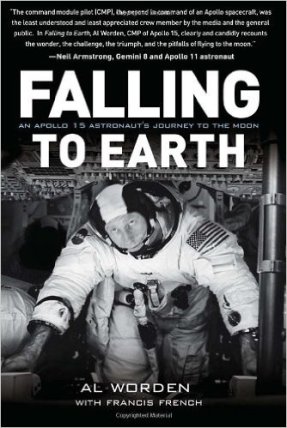
Q: In Falling to Earth is there anything that you had to leave out or edit out that you wish you could have included in the book?
Yeah, [Chuckling] there’s lots of things and that’s why we’re doing a second book.
Q: In the book Falling to Earth you talk about a lot of “Gotcha’s” [pranks]. What was your favorite “Gotcha” that you played or that you’ve had played on you?
Wally Schirra. Absolutely the best “Gotcha” in the world. We did a river cruise on the Mississippi a number of years ago to raise money for the foundation. It was, I think, the Mississippi Queen or something like that. Anyway, we went from New Orleans to Natchez and back.
Wally came in about the third day we were on the river. We had Gordon Cooper, his wife, Scott Carpenter, his wife, and a couple of other astronauts there.
I was still the chairman of the foundation and so we wanted to work out a little “Gotcha” for Wally coming in. We got in touch with the guy who ran the hotel on the ship–very, very nice, big, tall, good looking guy. He was very agreeable to doing something.
Here’s the way the scenario went down: Wally came onboard and our executive director was with him and she kept calling us on the radio and telling us where they were. The Coopers, the Carpenters, and the Wordens were all in a bathroom. Now, the river boat had a central aisle and all the rooms go off of that with balconies leading outside. So there’s a long hall when you go into a room, and the bathroom is right there. Then you go past that and it opens up into a bedroom, and past that is the open porch.
So we’re all sitting in the bathroom and she [the executive director] brings Wally into the room. The hotel manager had worked this thing out where he and his assistant–who was really a great looking girl–were in bed and he was on top of her. Wally comes in and he looks around and she [the assistant] sees that Wally is there and she screamed. You could have heard her a mile away, Wally jumped about three feet off the ground.
He’s [Wally Schirra] was standing there and the hotel manager turned around to look at him and said, “Oh, you’re Wally Schirra aren’t you?”
By that time, Wally had recovered his breath a little bit and he said, “Oh, yeah I am.”
The [hotel manager] reached over to the bedside table, picked up Wally’s book, and said, “Here, would you autograph my book for me?”
So Wally opens the book and in the center was a great big sign that says, “Gotcha!”
That was probably the best and, in fact, Wally was great at “Gotchas.” I actually got an email from him afterwards telling me what a great job that was and he was not one to give credit. That little “Gotcha” has kind of gone down in history. It was a great “Gotcha.”

Q: During the Apollo 15 mission to the moon, a few things went wrong. Which occurrences worried you the most?
The smallest things are the biggest worry, like when we had a water leak. It was on the fuel weld and that worried us because there was a ball of water that was getting bigger and bigger. What do you do with it? If it got loose and got by the instrument panel, we would have had a problem.
We did get that resolved rather quickly because they found the guy who had put in the water to begin with. It turns out that he hadn’t cranked the cap down tight enough, but we didn’t know at the time so we had to make sure. We had to get a tool out of the tool box and cranked it to put a certain amount of pressure on it.
Another problem we had was with the service propulsion system engine which has two ignition lines, redundant lines. There’s an A system and a B system. The normal procedure was to go into the computer to set up a burn, and the computer gives you the time of fire and the duration of fire. You could run it automatically if you wanted. The idea was that you get it all set up and a minute or so before the actual burn, you turn the two systems on. What happened when we did that [turned it on] the system fired as soon as I hit the switch–took the switch right off.
We started looking and found out that the A system had shorted out. We had to change all of our procedures where we went through all the automatic stuff. We had work-around procedures and they weren’t complicated, but that switch could have been a serious issue if we didn’t realize it had shorted out.
Q: What did you miss the most when you were away from Earth?
On the flight, I can’t say I missed anything; you keep pretty busy and when you’re not busy you’re thinking about the next things you have to do. So it’s either getting prepared to do something and doing it, or cleaning up after doing something and then getting prepared for the next thing. You don’t have a lot of time to think about back home.
Really, the truth is I miss my wife. She wasn’t there when I made the flight. I married her about 10 years after the flight, but if you were to ask me, “What do I miss the most today?” that would be it.
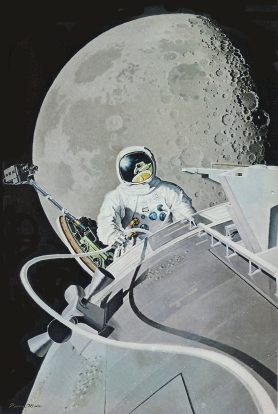
Q: What was going through your mind during your Extravehicular Activity (EVA) [space walk]?
I thought, “Wow, nobody has ever seen this. I am the first one that has been able to see this.” Funny part was that I would love to have had a camera out there to have captured some of that. They wouldn’t let me take a camera because they couldn’t see any reason for it. Well, we found all kinds of reasons for it.
I think that [Apollo] 16 and 17 were allowed to carry cameras. I had to go get Pierre Mion to paint the picture. Ed Hengeveld also did a great picture–I love his picture that he painted. But those are only paintings of what I did.
You’ve seen the one picture; I mean big deal, right? [chuckle] I’ve always considered that to be a conspiracy. They [David Scott and James Irwin] took lots and lots of pictures of each other down on the surface and that’s (as seen below) the only one they got of my EVA. I was like, “Oh ok, you guys planned it that way” [chuckle].
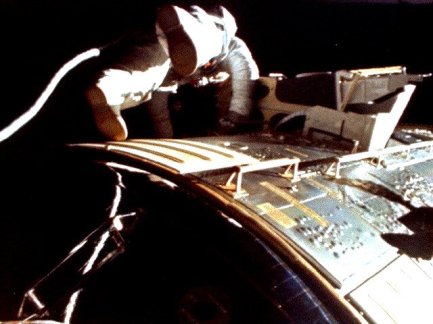
Q: Compared to those who walked on the surface of the moon, do you think that the pilots who flew solo around the moon were underrated in the public’s eyes?
We have a lot of publicity about the guys who walked on the moon, and that’s fine with me, I don’t care. It’s just that people don’t understand that there’s a commander who does all the work and then there’s an LMP [Lunar Module Pilot] who is along for the ride. He gets to walk on the moon and he becomes a very important person because of the media. The media never understood what the program was all about either; they focused on the guys with all the pictures.
The other thing is, on the surface, they had a video camera, Hasselblads, all kinds of cameras; they took lots of pictures of each other and there was a constant video feed to mission control of what they were doing so that everybody knew who was on the moon walking around.
You have never seen a video of a guy in orbit, never. Why? There’s no camera there. I wouldn’t have done it anyway because I don’t care, but that was the thing: you never hear about CMPs [Command Module Pilots] even though they are almost co-equal with the commander in terms of flying machines. Lunar Module Pilots just sit there and look at how much oxygen do we have left kind of thing, a huge difference. So I don’t begrudge that at all. I think it was great.
In the professional business of being an astronaut, the shortest path to being a commander is to be a Command Module Pilot. Lunar Module Pilots don’t normally get to be commanders. Now, there was a political push on [Apollo] 17 to put Eugene Cernan in as a commander. That’s an abnormal situation. All the other commanders were Command Module Pilots first. So from the profession side of the business, if you want to become a commander somewhere down the road, try and be a Command Module Pilot first.
The funny part is that I never asked to be a Command Module Pilot. What happened was that when we had the [Apollo 1] fire at the Cape in 67’, they had to develop an engineering team to rebuild that thing and they put me on that team because of my engineering background. I’m kind of a practical engineer, too; I think engineering is about always looking for the simplest ways to do something. Don’t make it too complicated. Make it simple.
I think that for a lot of reasons like that, I got put on that task force, but what resulted was that I knew more about Jack Swigert and I knew more about the command module than anyone in the program by the time we finished. He [Jack Swigert] ended up flying on [Apollo] 13 and I ended up flying on [Apollo] 15.
So, I didn’t really ask to be the Command Module Pilot, but I recognized that, professionally, it was the shortest route to becoming a commander. Lunar Module Pilots never fly anything; they are along for the ride. They’re passengers. They are what we called “systems engineers.” They look at the instruments and they look over the shoulder of the guy who is doing a dynamic flight, but they don’t really fly anything. So if you come to a point in your career where they say, “Ok, you’re going to be a commander,” and if you came up through an LMP [Lunar Module Pilot], you have to learn two spacecraft. Whereas if you come up as a CMP [Command Module Pilot], you only have to learn one. Big difference.
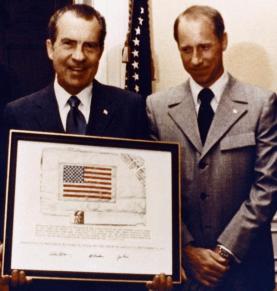
Q: Who were you most excited to meet and who left the biggest impression on you during your “Welcome Back” world tour in 1972?
Hard to tell. Richard Nixon was very good to us, he took us and our kids to the White House to have dinner. He grabbed all the kids and gave them a big tour of the White House, which I thought was kind of nice. He was very nice to us. He even had his butler go into the wine cellar and get his private stock of scotch so we could have a toast on the south porch.
The butler said, “You know, that’s your last one of those, are you sure you want to use it?” and he [Richard Nixon] said, “Yep. Bring it up.”
The flip side of that was–and we didn’t know this–but before we got there, he [Richard Nixon] asked his Chief of Staff what our names were. He didn’t know us from Adam, but he recognized what it was all about and was very good to us.
The other guy that made an impression on me, big impression, was the Pope–and I’m not Catholic–Pope Paul VI.
There were probably twenty-five of us in the room and we were having a private audience with the Pope; he’s coming down the line, shaking everybody’s hand and he got up to me and started shaking my hand and wouldn’t let go. He’s shaking my hand, looking at me, shaking my hand, looking at me, and finally he says, “I think I know you.”
I think, “What did I do? Ha.”
Well, we figured out finally that he had seen me doing children’s television. I did a number of shows with Fred Rogers, Mr. Rogers’ Neighborhood. Fred was my friend and we did a show before the flight and then we did like eight or ten more after the flight. The Pope had seen one of those.
So he [the Pope] saw me and then he saw me in real life and it clicked in his mind: “Hmm, I think I know you.” He was a very, very impressive little guy, I got to say, very impressive. Just the fact that he is the Pope, he is head of the billions of Catholics that are in the world…now, that’s a big deal and I was very impressed.
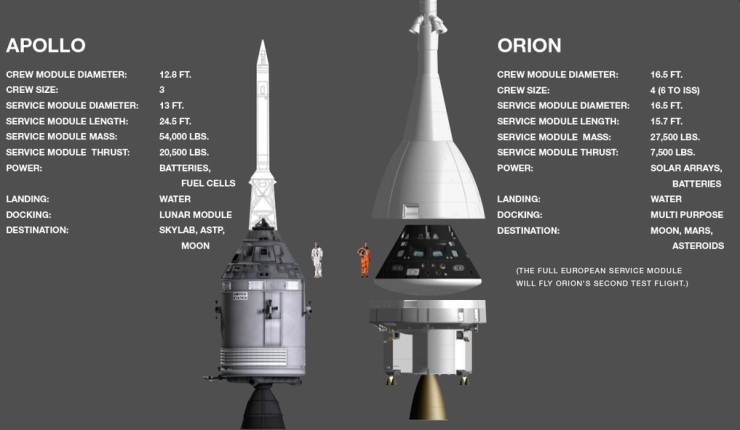
Q: What are your thoughts on NASA’s current plans to send humans to Mars with the Orion spacecraft ?
I’m not very thrilled by it. First place, the Orion is not the right spacecraft. The Orion is Apollo on steroids. It’s just a bigger Apollo. Orion has the same L/D [lift to drag ratio] as Apollo, which is very low, about .27. To come back from Mars, to reenter the atmosphere, and to not have to do some funny little games, you’d have to have a vehicle that has an L/D greater than 1. If you had an L/D over 1 on a vehicle, you could come back in the atmosphere and maneuver enough that you wouldn’t have to skip out. Orion’s going to have to skip out because it will be going too fast to stay in the atmosphere–doesn’t have enough lift. So I’m not thrilled with all of that.
It’s going to be a four-man spacecraft; so we’re going to send four guys instead of three, but we’re going to send four people on a year-and-a-half trip on that thing. Of course you’re going to have some kind of a habitat that will go with them, like a balloon of some kind, and all of that is fine.
My only problem is with the Orion. Why did they build the Orion? Why did they do it the way they did? Because, in their opinion, they knew how to build that because they already built the Apollo; so Orion is just a little bit bigger…and yeah they can do that. Problem is that none of the people who are building the Orion were there when Apollo was built. So I have a problem with that. If NASA had really been innovative when they came up with this program to go to Mars, we would have never seen an Orion; we would see something else.
But, a couple of things: people at NASA are more and more risk-averse; they want to build something that they are pretty sure is going to work, even if it doesn’t have all the capabilities they want. They’re a little bit afraid of building something that they are not really sure about. A vehicle with a crazy shape that is capable of doing the job is not something that they’d be comfortable with, but we’re never going to advance unless we make a paradigm shift in what we do. Orion is not a paradigm shift; it’s just a throwback to what we did 50 years ago. That’s all it [Orion] is, in my opinion.
Q: Do you think we’ll ever see the same level of excitement and public support for the space program that there was during the beginning of the Apollo era?
Yeah, I think we will. I think that going to Mars is going to generate the same kind of excitement we had when going to the moon. The problem is that lunar flights take two weeks and you have to hold people’s attention for two weeks. How that’s going to work for a year-and-a-half flight? I don’t know. That may be hard to do.
Q: What do you think is the biggest hurdle when it comes to getting humans to Mars?
I think we’re going to have to have someone give a John F. Kennedy speech to get the people in this country off their butts so they start supporting the program.
What people do not understand about the space program is that the primary product of the space program is not going somewhere, it’s developing the technology to go there. That’s what made our commercial enterprises in this country so successful over the last 40 years.
We developed silicon chips back in the 50s to do solid state devices and we were a beneficiary of that in the space program. You cannot touch anything today that doesn’t have solid state technology, silicon chips. Now we’re down into things that are an order magnitude smaller than silicon chips, and the next wave of that is going to be an order magnitude smaller than that. We’re going to have things that are down to the atomic level, doing switching in devices. That’s the technology that needs to be developed if we are truly going to be successful in going to Mars and going beyond Mars.
I think that there’s not a good understanding by the public that the technology that is developed for the space program results in a paradigm change in the technology in this country. That technology is used by commercial companies to make products like flat panel displays, cell phones, computers. I could name a thousand things. All of those are a result of the development of the silicon chip. It has made this country very successful.
Today, other countries are catching up. We still have the opportunity to go to the next step in technology, but it’s going to cost money and we’re going to use that technology to go to Mars.
Now, Mars is already kind of built. We’re already doing the silicon chip, the solid state stuff. In my mind, the technology that gets developed to make those kinds of trips possible is what’s so important to the program. It could make this country very successful again.
Q: You are a part of the Astronaut Scholarship Foundation that has been around for over 30 years and provided $3 million in scholarships. What is your vision and hope for the future of the foundation and for the impact it will continue to have on future generations?
Interesting you should ask because I just finished up on the strategic plans committee. The Foundation will be expanded in certain ways and that expansion will not occur in scholarships, but in what happens after a student gets a scholarship.
We’re going to get them much more involved with other people, like astronauts. We’re going to have mentors for these students, someone already in the business. We’re going to have a mechanism to get these students involved in corporations that are supporting the foundations, where these corporations are going to be looking at them as eventual hires.
We’re going to do a lot for students that has nothing to do with scholarships. We’re going to try to help them move their career along and enable them to do things that they wouldn’t be able to do without our help. We will have access to corporations with high-level people who can be mentors to them. We already have something like 40 mentors who are working with the students right now; we’ll probably expand that and get more mentors.
Starting next year, every year we will have a big event in Washington at the Air and Space Museum. It is going to be the Neil Armstrong award. The Neil Armstrong award is going to go to the student of that year. Along with that, we’re going to bring in all the students that are getting scholarships, instead of us going to them which we’ve been doing, we’re going to bring them all into Washington to give the scholarships there.
Along with that, we will have technical discussions and all kinds of things for the students while they’re there. So we’re hoping that we’re going to involve the students more and more with what we do and what we are.
Q: Do you have any advice for someone aspiring to become an astronaut?
Keep in mind, that when they have an application process, for every 1,000 applicants they get they are probably going to only pick one–there’s your odds right there.
My advice to young people if they are very serious about being an astronaut is to study whatever you want, but really do it well. You have to be outstanding in your field to get looked at.
I would never suggest that someone take a certain subject just because they thought it’s going to get them in the astronaut program. Number one, they wouldn’t be studying something that they aren’t in love with. Number Two, there is no guarantee that they are going to get into the program anyway.
Always follow a course of study that will set you up for your life’s work and then, if you’re fortunate enough, maybe NASA will call you. That’s the way I was. I never expected to go to NASA, never. Not something that I focused on. I focused on being the best pilot I could. I already had all the academic stuff, so I focused on the being the best test pilot I could be. What I found out was when I got to that point in my life where I was beginning to realize all of that, I had all the squares filled that NASA wanted. So I went into the application process, which was a surprise to me, I filled my name in and got in.
But I’d say that any student that is wondering what to do with their future: follow their dreams, follow their thoughts, follow what they want to do and do the best they can at it and you never know. When you get to the end of that road, other doors will open for you and that’s what I found out with me.
Worden concluded the interview by re-emphasising the importance of a leader that is willing to set a vision to help inspire current and future generations.
He said, “we have to have somebody that is a very strong leader to get up and say ‘Ok, I will dedicate this country to putting a man on Mars in 10 years and bringing him back safely, and here’s how we’re going to do it, here’s the money it’s going to take and the money is going to come from here, here, here, and here…,’ just like Kennedy did. He absolutely set this country on its ear when he did that; everybody was behind him. But we need a really good, charismatic strong leader to start that; let’s see if we got one.”
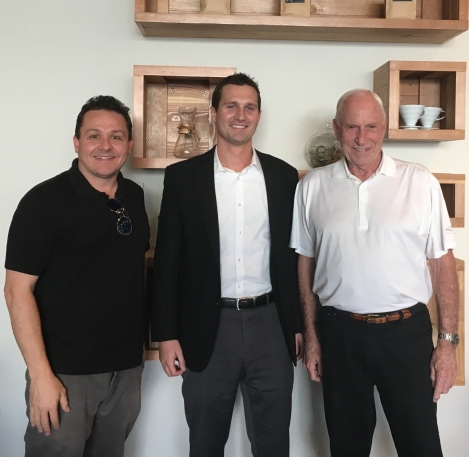
Keep up with the latest features and more space-related content at Journalists For Space.


Congratulations on your opportunity to interview Astronaut Al Worden. I like your article, especially Colonel Worden’s comments about technology being the best benefit of the space program and technology and creativity being part of our country being great. I like his comments about needing a charismatic leader and about following your passion. Sounds like your tagline.
LikeLike
Reblogged this on RevJamesBJones.
LikeLike